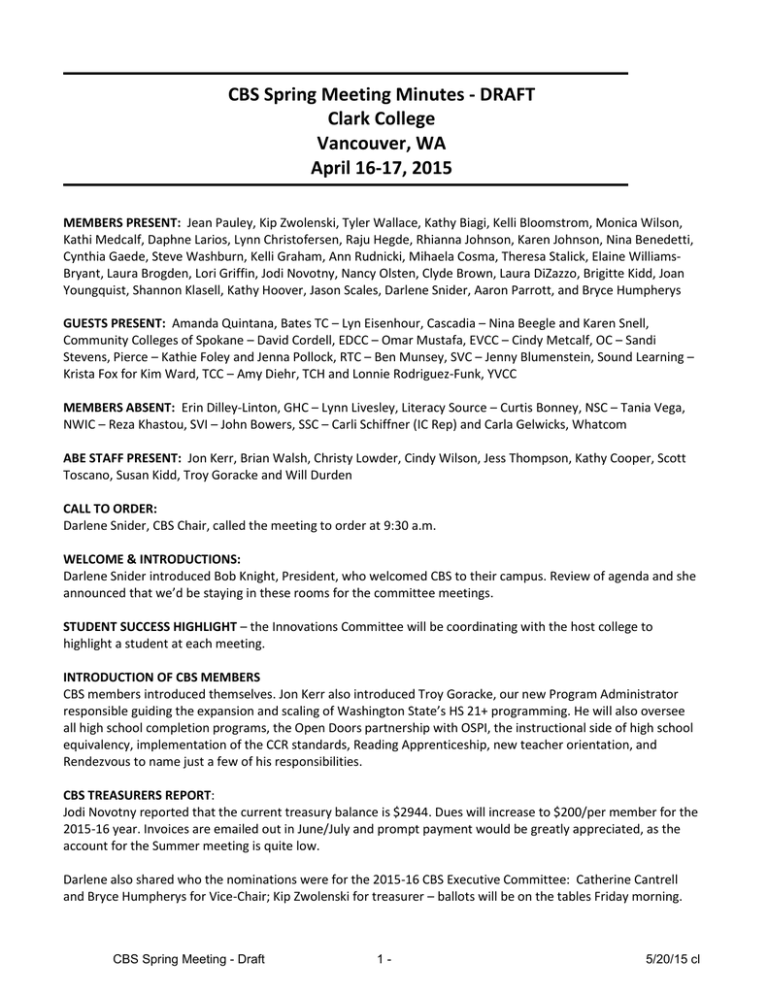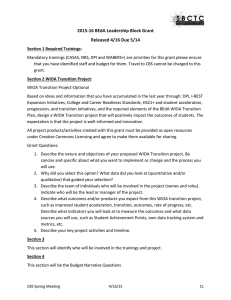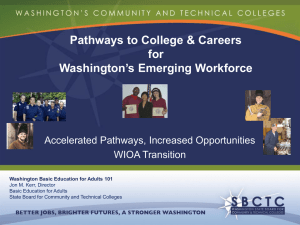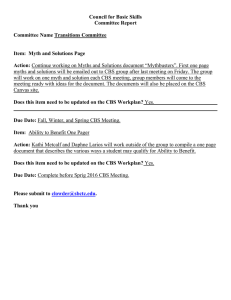CBS Spring Meeting Minutes - DRAFT Clark College Vancouver, WA April 16-17, 2015
advertisement

CBS Spring Meeting Minutes - DRAFT Clark College Vancouver, WA April 16-17, 2015 MEMBERS PRESENT: Jean Pauley, Kip Zwolenski, Tyler Wallace, Kathy Biagi, Kelli Bloomstrom, Monica Wilson, Kathi Medcalf, Daphne Larios, Lynn Christofersen, Raju Hegde, Rhianna Johnson, Karen Johnson, Nina Benedetti, Cynthia Gaede, Steve Washburn, Kelli Graham, Ann Rudnicki, Mihaela Cosma, Theresa Stalick, Elaine WilliamsBryant, Laura Brogden, Lori Griffin, Jodi Novotny, Nancy Olsten, Clyde Brown, Laura DiZazzo, Brigitte Kidd, Joan Youngquist, Shannon Klasell, Kathy Hoover, Jason Scales, Darlene Snider, Aaron Parrott, and Bryce Humpherys GUESTS PRESENT: Amanda Quintana, Bates TC – Lyn Eisenhour, Cascadia – Nina Beegle and Karen Snell, Community Colleges of Spokane – David Cordell, EDCC – Omar Mustafa, EVCC – Cindy Metcalf, OC – Sandi Stevens, Pierce – Kathie Foley and Jenna Pollock, RTC – Ben Munsey, SVC – Jenny Blumenstein, Sound Learning – Krista Fox for Kim Ward, TCC – Amy Diehr, TCH and Lonnie Rodriguez-Funk, YVCC MEMBERS ABSENT: Erin Dilley-Linton, GHC – Lynn Livesley, Literacy Source – Curtis Bonney, NSC – Tania Vega, NWIC – Reza Khastou, SVI – John Bowers, SSC – Carli Schiffner (IC Rep) and Carla Gelwicks, Whatcom ABE STAFF PRESENT: Jon Kerr, Brian Walsh, Christy Lowder, Cindy Wilson, Jess Thompson, Kathy Cooper, Scott Toscano, Susan Kidd, Troy Goracke and Will Durden CALL TO ORDER: Darlene Snider, CBS Chair, called the meeting to order at 9:30 a.m. WELCOME & INTRODUCTIONS: Darlene Snider introduced Bob Knight, President, who welcomed CBS to their campus. Review of agenda and she announced that we’d be staying in these rooms for the committee meetings. STUDENT SUCCESS HIGHLIGHT – the Innovations Committee will be coordinating with the host college to highlight a student at each meeting. INTRODUCTION OF CBS MEMBERS CBS members introduced themselves. Jon Kerr also introduced Troy Goracke, our new Program Administrator responsible guiding the expansion and scaling of Washington State’s HS 21+ programming. He will also oversee all high school completion programs, the Open Doors partnership with OSPI, the instructional side of high school equivalency, implementation of the CCR standards, Reading Apprenticeship, new teacher orientation, and Rendezvous to name just a few of his responsibilities. CBS TREASURERS REPORT: Jodi Novotny reported that the current treasury balance is $2944. Dues will increase to $200/per member for the 2015-16 year. Invoices are emailed out in June/July and prompt payment would be greatly appreciated, as the account for the Summer meeting is quite low. Darlene also shared who the nominations were for the 2015-16 CBS Executive Committee: Catherine Cantrell and Bryce Humpherys for Vice-Chair; Kip Zwolenski for treasurer – ballots will be on the tables Friday morning. CBS Spring Meeting - Draft 1- 5/20/15 cl MINUTES: The minute did not get reviewed and will be taken to the Summer meeting. FUNDING FOR STUDENTS TRANSITIONING TO THEIR FIRST COLLEGE CREDIT BASED CLASS – Lori Griffin, Pierce High School Completion (Fee Pay Status 12) and High School Completion – Nonresidents (Fee Pay Status 20) Model is based on the Highline model Decided due to low transition rates – helped them focus on basic skills Difficulties giving away the scholarships that were available (last year, only used 50%) They re-configured the HSC program so that the last quarter, before the student can be awarded their diploma, they must take their final quarter class that will include a college-level course, along with an ITRANS (academic support) class and the College Success course. And, if students successfully complete this quarter, then they will be awarded their diploma. 1st quarter of college is waived at Pierce - RCW: 28B.15.520(1)(a) [fee pay status 12] and (2)(a) [fee pay status 20] - Wavier of fees and non-resident tuition fees differential - community colleges. Pierce had already reduced the tuition for their HSC students who are 19 years of age and older. Lori presented the request with the "costs" to the college, and the benefits to the college: retention, completion, DOUBLE ASI points. The Board agreed to waive tuition for all high school completion students – as long as the student would have been eligible for the HSC discount. So ALL HSC students who qualified for the tuition discount could now get tuition for free with the $25 administration fee. Pierce no longer offers stand-alone GED®-prep classes. They also got rid of the traditional stand-alone ABE and ESL classes. All ABE and ESL students are in this program. So, if someone wants to study for their GED® only, they can, but they have to be in the integrated classes. All of their classes are taught as learning community-type classes. Every class has a content-specialist teacher and an ESL or ABE teacher in the same classroom. Lower level students are still combined (ABE and ESL) but their curriculum will just focus on their Reading, Writing, Speaking, Listening skills and are taught by ESL teachers. Sandi Stevens, ESL faculty, shared her experience so far. She said there was some "mild whining" from some students. Comments like, "Why do I have to take this college level English or Math class if I already have all my English or Math credits?" But, faculty and staff were able to show them the benefits of have college credit on their resume and other students helped convince these students. She also stated that many of her students who just wanted to study for their GED® ended up switching to HSC because they were already getting credit for it and wanted that first free quarter of college. Winter quarter, they had 5 students move on to their "last quarter" [that college level quarter]. She said quite a few came in during the first three weeks a bit panicked ("this is too hard" comments) but she just kept encouraging them and seeking out help in their I-TRANS classes, and she said they ended up doing just fine and sailing through their classes. Spring, they have 6 who have transitioned to that "last quarter." Overall, she LOVES the change! She said it was hard for the faculty at first, but everyone is on board now and loves it. WIOA’S RELATIONS WITH ESD – Tim Probst and Kelly Lindseth – ESDs WorkSource Integrated Technology Solution Tim shared his presentation about Increasing job placement and work-based learning through partnerships with the workforce system. Work Source system is where people go to help find jobs and that system is getting an upgrade! The new system is a job matching system – you enter your skills and it will search for the closest fit for the job matching skills. Transformational tool – employer / applicant System will do this objectively – skills / need Resumes will be ranked CBS Spring Meeting - Draft 2- 5/20/15 cl Enter your information and it will create your resume Program will be configurable Fraud prevention Build profile – begins to search as soon as you’ve entered your information Access to career resources Job seeker dashboard Potential for automated data “dumps” Other languages Yes, jobs will be removed as they are filled IC LIAISON REPORT – Highlights from the February IC mtg – Darlene Snider for Carli Schiffner 1) A panel on WIOA took place-featuring leadership from Workforce Education and from Basic Education. A shout out to Darlene for helping raise awareness about the impact this act has on our system and how we serve students. Another shout out to Brian Walsh for his work on moderating the panel. 2) The legislative update was provided by Marty Brown. 3) Discussed CTC Link and start dates being delayed further. August is set to be the deadline folks are working toward. Discussion about funding and the costs of implementation were discussed. 4) An update was provided by the Allocation Sub Committee: The group is working on issues related to the allocation formula given that it is to be enrollment driven with certain weighting. How to weight basic skills and high demand FTE? What does high cost mean? What does priority mean? A recommendation goes forward in April. I-BEST still needs to be addressed. 5) Enrollment: summary analysis shows enrollment decline in all areas. State FTEs went down 3%. WRT continues to fall, by approx. 20% for the system. Projected to be under by 1% for FTE target as a system. Good news...new students are coming in at a higher rate than previous year, which will help. 6) Diversity staffing: gap is increasing between faculty and student demographics. Strategic visioning committee is putting this together for the presidents meeting in April. Students of color are 2 times more likely to be classified as low income. Emphasize the importance of getting students of color through their associate’s degree. 7) The Transitions Committee discussed: 1. Revised I-BEST program approval process. SBCTC is making it easier and quicker to get I-BEST programs approved. Will Durden from the SBCTC is happy to act as a resource for I-BEST. There are trainings available that the SBCTC offer on I-BEST best practices. 2. Basic Education for Adults 2015-16 Transition plan submitted to the federal govt. feedback was gathered on the plan and the grant extension will take place in April, which will be very easy to submit. WIOA will change this so don't get too comfortable with this process! 3. Last year, the Basic Education for Adults Division transitioned away from the Washington State Adult Learning Standards and have adopted the College and Career Readiness Standards. 4. Ability to Benefit Discussion --restored --retroactive to July 2014 --how do we do this? How does this impact financial aid? --Where is the discussion at with the student services group? Remember to check in with co-workers in financial aid CBS Spring Meeting - Draft 3- 5/20/15 cl Note to Committees: Please identify one or two top priorities that your committee has been working on this year. We proposed some expected outcomes for this year and we need to report on what committees focused on this year. Identify tasks as complete or progress made so far. Also, identify one top priority that you see for next year. Darlene needs to have this information by May 15th so that she has it for the spring IC meeting. SBCTC UPDATE – part 1 – Jon Kerr We need your input on the draft WIOA rules and regulations Legislative Update – Operating Budget o Caseload funding for ESL (House & Senate Bills) – it passed out of committee in the house, but did not pass out of committee in Senate. It went further than we had imagined and we knew will take several runs, but good news was that there was no opposing testimony. o Corrections to allow AA degrees to be offered to incarcerated adults-HB 1704. This bill is in its second year and did much better, it passed out of the house and went to the Senate Law and Justice Committee - many testified, but it did not pass out. The corrections bill itself, HB 1704, is considered dead. However, the issue is still alive, given that in the House operating budget proposal, Rep. Pettigrew inserted a proviso that would allow us to provide postsecondary instruction in prison education programs. This will be part of the budget negotiations that have begun as both the House and Senate will now go into conference. o The Governor’s proposed budget had two priorities of Basic Education for Adults $5 million-BEdA and $5 million I-BEST. We have still not shown up in either the House or Senate Budgets. Our 6 priorities: Freeze or reduce tuition and fully backfill the lost revenue. Preserve and fully fund the collective bargaining agreements. Full funding for I-732 is also a priority (COLA’s) Increase funding for the State Need Grant Include funding to expand the MESA Community College Program Allow the Department of Corrections to use existing funds to offer associate degrees. o Allocation Update – Presidents’ taskforce on the proposed new allocation model weights funding for basic skills at 1.3% which means an increase of around $1,000 per FTE. At their meeting last week, the WACTC executive committee approved a system work group to develop recommendations on enrollment counting. Implementation of the new allocation formula that uses college enrollment levels as one of the factors for distributing state operating funds to colleges will put more attention on consistent enrollment counting and reporting among colleges, especially for basic skills and high demand/high cost courses. The group will provide recommendations to WACTC by April 2016 and we have 3 representatives on the taskforce from CBS Kim Ward (TCC), Jody Novotny (Renton), and Catherine Cantrell (GR). WA’s Performance Measures 2015-16 Targets Negotiations of WA's Performance Measures We are required to go up a quartile in our negotiations with OCTAE. Time and Effort Guidance – Jon Kerr Our auditor has asked that we remind programs to review T & E practices. In one recent audit, the provider was unable to provide time and effort reports for all employees who worked on and were paid through the BFET, Perkins, WorkFirst, and ABE grant awards for programming from October 2012 through May 2014. CBS Spring Meeting - Draft and Time and Effort 4- 5/20/15 cl Recommendation: Under current federal guidelines the basic time and effort rules are: 1) “The federal government requires time and effort reports for all faculty or staff who are compensated, in whole or in part, by a federal grant, or whose efforts are used to satisfy a required voluntary match for federal grants” a. This means that nearly everyone that works in BEdA should maintain T&E since most state funds are reported as match. 2) Classified staff must complete a T&E record that shows the actual daily hours worked on each grant or match account. The report may cover one or more pay periods. 3) Exempt staff/faculty must complete either a daily record (as above) or complete a Plan Confirmation that reflects the actual time worked on the grant as a percentage of the total time worked for the college during the most recent month or academic period. 4) Either the individual reporting the time or effort must certify (sign) the document or a responsible person with knowledge of the individual’s activity must certify that the hours or percentage are reasonably accurate. If the actual hours or percentage worked on each federal grant is more than 5% different than the amount budgeted/charged, then the college must make an adjustment prior to the end of the grant period. If you have questions or need assistance, contact David Bishop, Audit Coordinator SBCTC, dbishop@sbctc.edu / (360) 704-4389. I-BEST Update Leadership Block Grant Guidelines - Will Durden and Leadership Block Grant Questions - Cindy Wilson COMMITTEE REPORT OUTS: Transitions – Daphne Larios o Reviewed work plan – list of job descriptions compiled over this year and will share soon o Use the SkillUp Washington tool – barrier removal tool to work with students o Smarter Balanced transition courses – instruction / rigor / transitions o Job descriptions from colleges Innovations Committee – Mihaela Cosma o WIOA Requirements – potential practices: Mini I-BEST; Multiple Pathways; IC3 (digital) – reframing content. o CCR Standards training need – adopt some of the WALS training & implementation o I-BEST by Fall will be using CCRS o More Team teaching training will be available Retention – Jodi Novotny o Conduct a comprehensive evaluation of the basic skills assessment system to determine if current tolls align with state and federal goals for basic education for adults and accurately demonstrate evidence of performance o The Retention Committee would like to review and provide input to the 2016-2017 Assessment Policy Action: During summer/early fall 2015, Retention Committee members will review, discuss, and provide input to the State Board BEdA office on the Assessment Policy o This committee is considering becoming the State Indicator Outcomes Score Committee (or similar) to monitor the BEdA provider outcomes across our state under WIOA o Monitor SSN and consent box checked by provider and over time CBS Spring Meeting - Draft 5- 5/20/15 cl Action: Many of the outcomes under WIOA will be measured by data match, and specifically, by SSN data match (employment). How are we doing with collecting SSNs when available and are students consenting? High School 21+ Task Force – Karen Johnson o We made ALL of our goals for this year!!! o 19 colleges are running HS 21+ programs; identified and awarded 167 HS diplomas, 2000 in program o Proper Exit Codes – all programs should be using exit code 6 and EPC code H21 o English Language Acquisition (ELA) and WIOA and HS 21+ Action: programs should look into using HS 21+ as an opportunity for ELA students/ programs as even the lowest level students need to be on a pathway. High school completion or equivalency and transition to post-secondary can be such a pathway. Gains/measures for this pathway can be movement from a federal level to a diploma and steps in between. A transcript of report card that is graded can show progress. A HS 21+ transcript can count. Consider HS 21+ on ramps. Suggestions included Washington history content in level 3. We need to begin looking at HS as a pathway for ELA. o Troy Goracke is here and ready to answer all of your HS 21+ questions o Open Doors Youth Re-engagement (HB1418) programs – information was shared on HB1418 programs and sharing of funds to support efforts in basic skills programming o May 15th will be the HS 21+ Roundtable at Renton Technical College o Curriculum Repository Action: Discussion continues on developing a curriculum repository for HS 21+. Troy Goracke will work to figure out how and when to send invites to the group on Online Educational Resources (OER). Jon Kerr will try to find funds for that. CBOs – Ann Rudnicki o What’s best relationship CBO/College in WIOA I-BEST and HS 21+ transition o Looking at SAI structure and does this adequately reflect the partnership serving students SBCTC UPDATE – part 2 – Jon Kerr Student Complaint process / form and talking points: Recently added wording in Title IV of the federal Higher Education Act requires states to have oversight of higher education institutions for a certain category of student complaints, specifically consumer protection complaints; states processes for doing so must be in place by July 1, 2015 The process and the types of student complaints that fall into the consumer protection category are described in the Consumer Protection (Title IV) Student Complaint Form, for more information, please contact Joe Holliday, SBCTC Director of Student Services, at 360-704-4334 or jholliday@sbctc.edu SBCTC and the CTCs must provide notification of the new consumer protection complaint process to students; beginning in July, 2015; SBCTC Student Services and the Washington State Student Services Commission (WSSSC) are providing coordination of this notification. Watch the language used around eligibility for financial aid…especially GED® and HS 21+ o o o Title IV Student Complaint Wording for CTC's SBCTC Consumer Protection (Title IV) Student Complaint Form Student Complaint Process Talking Points rev. 4/2/15 WIOA Major Changes / Performance / One Stops o o BEdA 101 Pathways to College & Careers – Jon Kerr This PPT is for sharing with partner agencies – please customize as you see fit. Rules & Regulation comment period April 16-June 15 WIOA Major Guiding Changes and Perf.-Basic Education for Adults CBS Spring Meeting - Draft 6- 5/20/15 cl Looking at the Rules and Regulations – what may not work for us and how can it be modified? Kathy Cooper will develop a form to collect CBS feedback and will create a roll-up for our state and CBS feedback. ESL is now English Language Acquisition (ELA): “Under WIOA [in addition to helping English language learners achieve competence in reading, Writing, speaking and comprehension of the English language], the ELA program of instruction must also lead to attainment of a secondary school diploma or its recognized equivalent and transition to postsecondary education or training or lead to employment.” EL Civics Allocation- 65% of growth in the state determined by calculating each state’s share of a 10-year average of the data of the Office of Immigration Statistics of the Dept. of Homeland Security (DACA and DAPA) for immigrants admitted for legal permanent residence for the 10 most recent years. 35% for the 3 most recent years for immigrants admitted for legal permanent residence. This changes how the State receives funding, NOT how you get your funding. 2015-16 Transition year – there are no civics and performance measures in the transition year, BUT all else is changing this year. Measurable Skill Gains The measurable skill gains indicator would capture documented progress on interim milestones leading up to the final certification. The measurable skill gains indicator is intended to capture important progressions through pathways that offer different services based on program purposes and participant needs. In using this indicator as a measure of interim progress of participants, the Departments are considering how States can document progression during participation in an education or training program in a standardized way. Documented progress could include such measures as: 1) the achievement of at least one educational functioning level of a participant in an education program that provides instruction below the postsecondary level; (federal level gains) 2) attainment of a high school diploma or its equivalent; 3) a transcript or report card for either secondary or post-secondary education for 1 academic year (or 24 credit hours) that shows a participant is achieving the State unit’s policies for academic standards; (Report card) 4) a satisfactory or better progress report, towards established milestones from an employer who is providing training (e.g., completion of on-the-job training (OJT), completion of 1 year of an apprenticeship program); 5) the successful completion of an exam that is required for a particular occupation, progress in attaining technical or occupational skills as evidenced by trade-related benchmarks such as knowledge-based exams; and 6) measureable observable performance based on industry standards. o WIOA Funding-One-Stops We are required by WIOA to pay 1.5% of your federal grant(s) ABE and Civics to fund One Stops Q) can we pay the 1.5 % out of other funds? Q) how can sharing be done in kind? Q) what about virtual One Stops vs. brick & mortar? Yes, virtual is ok o WIOA Readiness Checklist Planning Tool o WIOA Self-Assessment Side-by-side Comparison CBS Spring Meeting - Draft 7- 5/20/15 cl SMARTER BALANCE AND TRANSITION COURSES – Darlene Snider, Tyler Wallace, Susan Kidd and Cindy Wilson Smarter Balanced and Smarter Balanced Assessment Scores and Transition Courses Implementation Guidelines (English & Math) and WA Final Smarter Balanced Agreement for Placement in CTC What does competency look like? Have to have same rigor in high school as college level; don’t want students to just take the path of least resistance. They are grappling with assessing portfolios – what does college readiness mean to both groups? Balancing consistency across systems Big Bend Community College’s math emporium – first 2 courses covers most of WAMAP – develop a stripped down version of BB’s COLLEGE AND CAREER READINESS STANDARDS ACTIVITY – Laura DiZazzo and Jenna Pollock Laura asked the group to review CCR Standards - Reading pg 13-21 and consider these questions and work in small work groups. (Full Standards: CCR Standards ) What one word best describes how you feel about the transition to CCRS? How do you think your faculty will respond to CCRS? What do you think will be the biggest challenge? If we have the option, do you hope to transition to CCRS over the course of: 1 year, 2 years, 3 years What (brief) ideas do you have for beginning your implementation plan? What overlaps do you see with this shift to CCRS and other program shifts happening? How have you already begun to make these shifts? Laura’s PPT from meeting Final CCRS from Activity OPEN EDUCATIONAL RESOURCES – Brian Walsh Coogle.it/diagram – these are all free self-paced courses – please contact Brian at bwalsh@sbctc.edu if you have any questions, as we ran short of time at the meeting. ELECTION RESULTS – Darlene Snider Vice-Chair – Catherine Cantrell, GRCC Treasurer – Kip Zwolenski, BTC And Kim Ward will be your Chair for the 2015-16 year. SYNTHESIS OF KEY POINTS: Kathy Biagi summarized the key action items. Committee chairs – please get reports to Christy by 4/30. Include work plan 2015-16 ideas. Christy will forward to Darlene. Dues – increase to $200 per person. Please get in ASAP OR we’ll be brown bagging it at the Summer CBS meeting. Referral to WorkSource online to get progress updates. (go2worksourcenews.com) Check with your college/CBO fiscal department regarding Time and Effort reporting. Make sure on track with this, including match! SBCTC is happy to help any program with this. Host sites for 2015-16: Fall – Pierce; Winter – Spokane; Spring – CBC and Summer – YVCC attached to Rendezvous Rendezvous registration – must pay out of the FY16 Leadership Block grant ($100/person) June 15th – final day for budget revisions July 15th – final day to submit invoices BEdA Leadership Block grant due May 14th Election results: Vice-Chair, Catherine Cantrell; Treasurer, Kip Zwolenski CBS Spring Meeting - Draft 8- 5/20/15 cl Watch for info from Kathy Cooper re: WIOA regs and rec/suggestions as to how BEdA programs can implement regs (will/will not work) Read Title I as well as Title II Be aware of student complaint process – use qualifiers Look for May 7th training email to get registered ADJOURNMENT: The meeting was adjourned at noon Meeting schedule for 2014-15 Summer meeting – July 15, 2015 at Cascadia College CBS Spring Meeting - Draft 9- 5/20/15 cl



